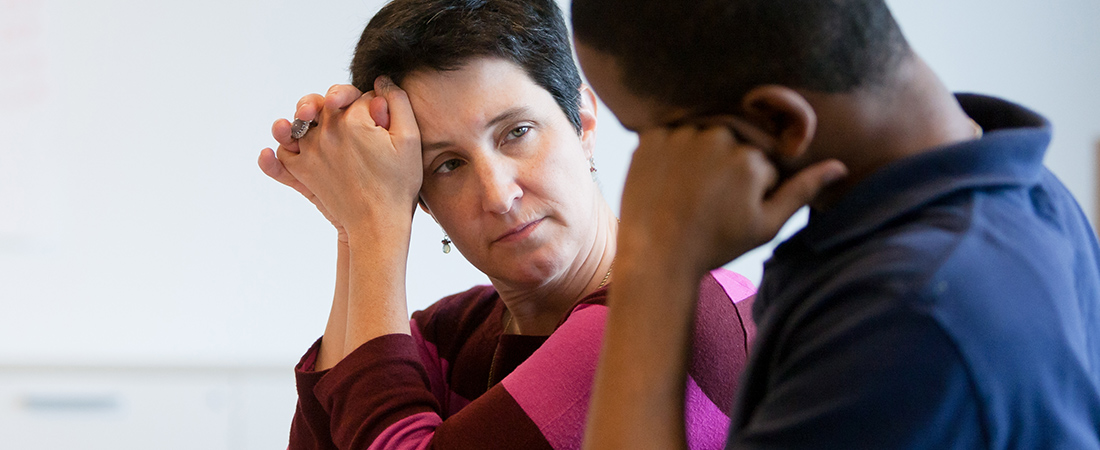The Mathematics of Inequality

"Mathematics is a human activity, and as such, we are all quite capable," says EDC's Eden Badertscher.
Eliminating the mathematics achievement gap—the pernicious, persistent disparity in test scores between black and white students in the United States—requires more than improvements in mathematics learning and teaching, believes EDC’s Eden Badertscher. So before she talks about problem solving in her professional development workshops, she dives into some topics that are seldom covered in mathematics textbooks.
Slavery. Jim Crow. Civil Rights. Systemic racism. The school-to-prison pipeline.
These discussions can make some teachers uncomfortable. After all, they teach mathematics, not social studies or history. Tackling racism requires them to be open and vulnerable, which is hard work for everyone—including Badertscher, who is white.
“I am part of the dominant system,” she admits. “Sometimes I unwittingly take advantage of the very system that I am trying to change.”
However, Badertscher believes that all educators must confront the legacies of racial inequity, segregation, and discrimination in the United States if they are ever to improve mathematics achievement among black students.
“These gaps are not really about achievement,” she says. “They are about opportunity. Just giving people a new curriculum or a new practice isn’t really going to do anything if you are not, in fact, challenging people’s beliefs about who can do mathematics.”
Badertscher has been examining the connection between education and social justice for nearly two decades. For her senior thesis at Princeton, she wrote about how social science was used to support desegregation, then reappropriated to continue discriminatory practices against African Americans in the wake of the Brown v. the Board of Education decision. Once she became a mathematics educator, she realized that to talk about mathematics opportunity was also to talk about power.
“In school, mathematics is a tool that we use to separate kids,” she says. “We use it to label students, track students, and determine the opportunities they will have. So if we have racial issues playing out in that context, then mathematics becomes a tool to perpetuate inequity."
Disrupting the narrative
Badertscher saw these inequities at work during her tenure as a mathematics supervisor in the Pittsburgh Public Schools. Even during conversations about the achievement gap, she recalls examples of institutionalized discrimination against black students.
“I talked a lot with educators about how to improve math instruction,” she recalls. “And I would constantly hear others say, ‘I wish we could teach math this way, but our kids can’t do it.’ We’ll never see the opportunity gap closed unless we disrupt that fictitious narrative. Mathematics is a human activity, and as such, we are all quite capable.”
This notion of disruption is at the heart of Badertscher’s teacher professional development work at EDC. Her National Science Foundation-funded project, Designing for Equity by Thinking in and About Mathematics (DEbT-M), uses history and social justice to help educators see how systemic inequalities are perpetuated in the mathematics classroom.
These workshops go much deeper than mathematics. She and her team talk about how the promise of desegregation in the United States was not followed by opportunity, but rather by institutionalized oppression. They talk about how the mathematical discoveries, traditions, and contributions by people of color are often excluded from textbooks, a decision that serves to preserve the primacy of white culture in mathematics. (Badertscher says that the dearth of black teachers and mathematicians in the field only reinforces this notion.) And they talk about how mathematics tests that have been designed for white, middle-class students have been used as a tool to justify the marginalization of students of color.
Her point? Black students, as well as their teachers, are continually bombarded with the message that individuals of color cannot succeed in mathematics—and that message is what makes eliminating the opportunity gap so difficult.
“We all pay the consequences of this myth,” she says, “but nobody pays it more than students who are devalued daily by these negative messages.”
But Badertscher knows DEbT-M is making a difference. One teacher told her that participating in the professional development “renewed” her desire to teach; another said that participating in a community of learners helped her not feel alone anymore. And for one white teacher, DEbT-M inspired him to talk about institutional racism with his own children—something he had previously not even realized he should do explicitly.
“If you take on this work, you’re not blind to how hard it is,” says Badertscher. “Sometimes you really mess up. Finding a group that is willing to take on these issues with you in spite of the challenges is essential. Nobody can do it alone.”